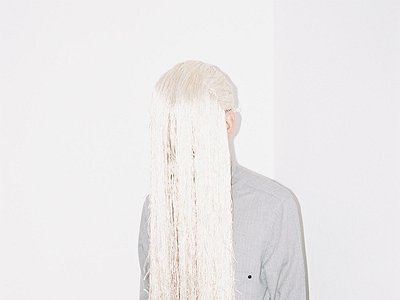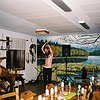Part 1
Name: Peder Mannerfelt
Nationality: Swedish
Occupation: Musician
Bands/Projects: Peder Mannerfelt/ Roll the Dice / Subliminal Kid
Labels: Archives Intérieures/ Digitalis / The Leaf Label
Musical Recommendations: Hanna Hartman / Klara Lewis
When did you start writing/producing music - and what or who were your early passions and influences?
I started out playing guitar as a teen in different punk and hardcore bands. I began to gravitate more and more towards experimental and extreme types of music and realised that the only way forward for me was to learn how to make music with a computer.
After school I started interning as a studio engineer in a very commercial pop studio here in Stockholm, slowly learning about how to work within the context of a music studio.
For most artists, originality is first preceded by a phase of learning and, often, emulating others. What was this like for you? How would you describe your own development as an artist and the transition towards your own voice?
I would say it’s just the last few years that I have started to feel comfortable in my own music making and that I can make the music I feel truly is my own. It’s become more minimal and less over-produced as I feel more secure in what I do. For the first time in my life I can feel the music pouring out of me.
What were your main compositional- and production-challenges in the beginning and how have they changed over time?
As you said in the last question, it’s so easy to just emulate someone else’s work and in doing that it’s pretty easy to loose track of what you set out to do originally. When working with someone else it’s easier to progress as you bounce these things back and forth. This has been a huge issue for me to overcome when working alone. Now I'm in a place where I can work very effectively and decide early on whether something is worth continuing with or whether to start something new.
Tell us about your studio, please. What were criteria when setting it up and how does this environment influence the creative process? How important, relatively speaking, are factors like mood, ergonomics, haptics and technology for you?
I have had the studio I'm in for almost 10 years now and it’s pretty much in a constant state of change. I get really stressed out if I have some equipment or an instrument sitting on a shelf that I never use so I always get rid of something when I buy something new. For a long time I just kept on piling up stuff thinking that "oh this is a classic piece of kit, I can’t sell it” but when I sold my 909 two years ago, it was such a relief because I wasn’t using it and I got almost twice what I had paid for it.
[Read our feature on the Roland TR-909]
The ergonomics and the setup in the studio is really important to me, as is having a tidy space. I always un-patch everything before I leave for the day and try to put everything back in it’s place. This makes a blank canvas and I can start fresh on something the next day.
What are currently some of the most important tools and instruments you're using?
Coffee machine, computer, ergonomic swivel chair, window, lunch.
Many contemporary production tools already take over significant parts of what would formerly have constituted compositional work. In which way do certain production tools suggest certain approaches, in which way do they limit and/or expand your own creativity? Are there any promising solutions or set-ups capable of triggering new ideas inside of you as a composer?
Limited production tools are always the best. When you have to squeeze 110% out of an instrument or the equipment, it not only comes alive but it also starts to become something else, just when it’s on the brink of its capability. It’s a great way to let the equipment lead the way within the composition. I love riding that edge of when it almost starts to break up, it’s also really rewarding to fully utilise everything you own.
It’s kind of an old school mentality that comes from working with an mpc or a tracker software where the polyphony was very limited and you have to steal or share voices from different sounds. This technique can apply to digital, analogue or acoustic instruments. There's nothing as under stimulating to me as endless lists of presets or samples.
Could you describe your creative process on the basis of a piece or album that's particularly dear to you, please? Where do ideas come from, what do you start with and how do you go about shaping these ideas?
The Swedish Congo Record started out as a very abstract idea. Instead of just sampling something I wanted to try and make my own version of it, I approached it as doing cover versions of the original album.
But what I originally set out to do in a couple of weeks stretched out to almost nine months. Partly because the fidelity of the original recordings (made in what was then the Belgian Congo in the 1930s) was so low, as I kept on listening more deeply to it, I started to find more layers and nuances within the music. I also set out to synthesise almost everything from the ground up myself and I fell into a pretty deep rabbit hole programming formant frequencies to emulate vocals and speech.
I don’t really see this as an original album because all of the compositions were already there, it’s more of a research project.






